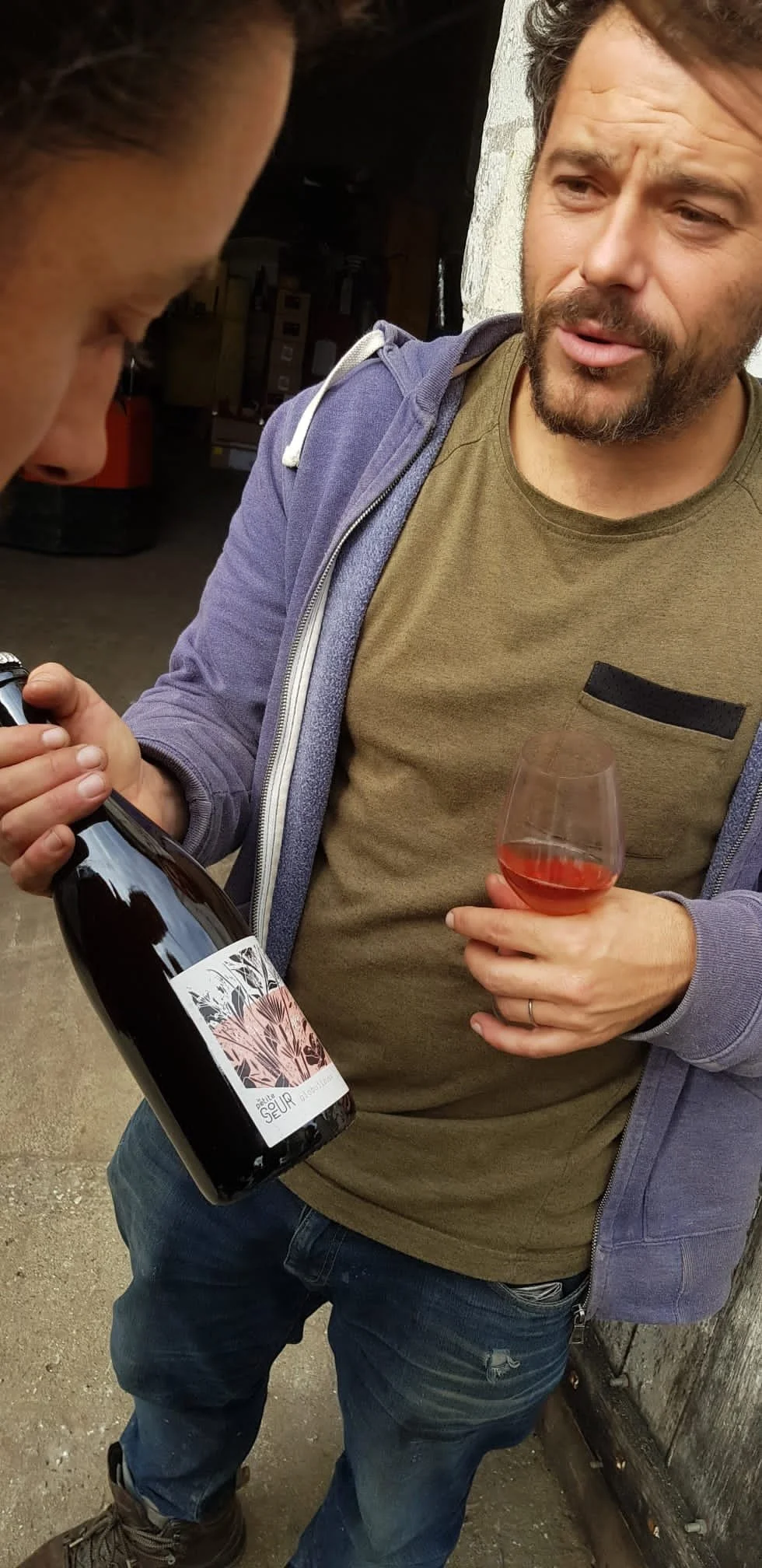La Petite Soeur / Adrien de Mello
La Petite Soeur is a small domaine in Anjou run by winemaker Adrien de Mello. Farming four hectares of vines near the village of Saint Aubin de Luigné, Adrien creates wonderfully pure, classical and delicious expressions of chenin blanc, cabernet and other local varieties.
Originally from Brittany, Adrien first began working in wineries in 2003. He gained experience with years spent working in Quebec, Stellenbosch, Virginia and, finally, back in France where he worked for five years at a biodynamically run estate in the southern Rhone.
In 2015 Adrien learned of an organically farmed domaine in Anjou (Clos de L'Elu) that was selling a 3.5 hectare parcel of their 25 hectare property and with relish Adrien leapt at the chance to be closer to Brittany and to begin his own domaine.
Adrien's 3.5 hectares are comprised of black and grey schist (generally sitting beneath around 20 cms of clay) – a predominant feature of this point of the Armoricain Massif and a key difference between Anjou and the much younger calcareous soils of bordering Saumur.
The average vine age in Adrien's vineyard is 50 years and pruning is undertaken, first and foremost, to respect sap flow. The chenin blanc and gamay are trained in the gobelet system while the cabernets and sauvignon blanc are cane-pruned. His vines have been farmed organically for some time, but since taking over Adrien has worked hard to gain both organic and biodynamic certifications. He plows with the help of his horse, Toscane, and forages plants such as comfrey, nettle, buckthorn and yarrow to create teas for the vineyard.
Adrien’s holdings comprise cabernet sauvignon, cabernet franc, gamay, sauvignon blanc and chenin blanc. Some of the grapes are vinified as single varieties, while some are blended. Extractions tend to be more gentle, with whole bunches included for the reds, and some of the whites are macerated on skins. In the winery, Adrien works largely with fibreglass and loves the sense of purity that this material captures in the wines.
The direct-press chenin and the cabernet blend in many ways resemble the more conventional white and red wines of Anjou, with a clean classicism, vivid varietal character, and a strong sense of place, while cuvees like Kumu demonstrate a more distinct and inventive style – albeit with great precision and judgement with the blending and elevage.
Anjou, France
Information on previous wines
-
Direct-press chenin blanc grown on schist and vinified in fibreglass.
2023 Medium-bodied, clean and classical, with some primary texture, delicate varietal character and minerality.
2022 Medium-bodied, clean and classical, with a chiselled, resolved structure, delicate varietal character and minerality.
-
From a new vineyard with 30-year-old vines purchased by Adrien in 2021. Direct-press chenin blanc from a single site planted on schist
2023 Raised in fibreglass. Medium-bodied, clean and classical, with some primary texture, delicate varietal character and minerality.
2022 Raised in barrel. Clean, classical, and concentrated with a resolved structure. A slightly richer style and very lightly oxidative, with a finer texture as result.
-
From two parcels of sauvignon on the home vineyard. The slightly more elevated parcel produces smaller berries with more intense aromatics, and this is pressed directly, while the site further down the slope produces softer broader flavours and this is macerated for a short period.
2023 Lightly macerated, with restrained tropical fruit flavours and varietal herbaceous character2022 Lightly macerated. Generous yet precise, with freshness and texture, and tropical fruit flavours.
-
2022 Macerated grolleau gris (negoce fruit), and chenin blanc and sauvignon blanc from the domaine, grown on schist. Pink in the glass, with various shades of primary fruit, freshness from the just-ripe sauvignon and some earthiness from the grolleau.
-
2023 A blend of direct-press cabernet sauvignon and macerated sauvignon blanc. Light-to-medium bodied and orange-pink in the glass. Grassy and saline with shades of ripe white and pink fruit.
-
2021 100% cabernet franc vinified with a portion of whole bunches in fibreglass. An excellent year with ripe, pure and textural red fruit and vivid varietal pyrazine character.
2020 A blend of cabernet franc (60%) and cabernet sauvignon (40%), all grown on schist and fermented with a portion of whole bunches. Open, fragrant and vivid varietal aromas, with concentrated red and dark fruit and primary phenolics on the palate. Lower ABV.
-
Cabernet sauvignon grown on schist and raised in fibreglass tank.
2022 Pure and varietal, with freshness and sinew in the structure and perfectly ripe yet restrained fruit.
2021 Pure and varietal, with intense freshness and sinew in the structure and perfectly ripe yet restrained fruit.
-
Gamay grown on schist, fermented in fibreglass with a portion of whole bunches.
2023 Fine, with a core of red and some darker shades of fruit and distinctly varietal acidity, with a gentle sappiness from the stems and some minerality.
2022 Fine, with a core of red and some darker shades of fruit and distinctly varietal acidity, with a gentle sappiness from the stems and some minerality. Lower ABV.

